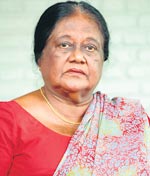
Children’s minds have to blossom too
“We are extremely careful about what we give children to eat. We worry about germs and the nourishment they get. Isn’t it strange that we don’t think so carefully about nourishing their minds – which is equally, if not more, important?” asks Somalatha Subasinghe, the founder of the Lanka Children’s and Youth Theatre Organization, which has this year been established as a Foundation. To celebrate that transition, and to mark 25 years of the existence of this group, they will hold a theatre festival for young audiences from August 9 – 12 at the Lionel Wendt Theatre and it seems an opportune moment to talk to the founder about why she had embarked on this journey and what she feels about it now.
“In the 1960’s, when I was a school teacher, and also associated with drama, thanks to Sarachchandra who was doing his research while I was a student at Peradeniya, I could sense that there was a forgotten person in the country: the child. His or her importance was not given recognition. This I thought was a grave error,” she says explaining her desire to start the first ever drama school for children’s and youth theatre. At that time, an institution existed for mainstream drama, in Dhamma Jagoda’s workshops and an interest in children’s drama was established by people such as Bandula Jayewardene, Wimal Diyasena etc, who were instrumental in getting a German expert to Sri Lanka who helped in producing classics like “Tikiri Menike” and “Saththunge Punchi Gedera” – but there was no training institution as such. Somalatha’s exposure to children’s theatre in Britain, Prague, Moscow and East Berlin as a UNESCO Fellow and later her participation in a course at Carl Orff Institute in Salzburg on “Music and Movement for Children” gave her the necessary background to begin such a school. “A child’s mind needs space to bloom. It has to wonder at the beauty of the world before it is given the hard facts of life. But that space is not given in schools now. There is apparently no time for it. We are almost stunting young minds from inception. This is incredibly harmful,” she says, her anger apparent in what she has seen first hand within the school system now. “In developed countries, plays are shown during school hours to schoolchildren. It is part of their education process. I wish it was so here because that would take away the burden put on parents, financially or in any other way, to expose their children to such art. The school can be responsible for giving them that experience.” Somalatha has about seven plays for children, which she produces throughout the year and the festival will provide a platform for young theatre directors to show their productions. It is noteworthy that the directors are products of her own school. Many have become award winning directors, television or film actors and script writers, all, committed artists who have chosen drama as a way of life. “I have come this far, mainly because of my husband, who gave everything he had to support me and my art; my two daughters, who tolerated all this, my son-in-law who has become the machine behind this movement and then my actors and actresses whose commitment to the cause of drama and through it to the nation, is total,” says Somalatha. She has no doubts that the work of the Foundation will be carried forward by its younger members. Her daughter Kaushalya Fernando is an award winning actress and director and her husband, Chandana Aluthge, though holding a PhD in Economics is also into choreography, lights and stage management. “All the members of the group are fully fledged now,” she says. Independence is paramount in working in an environment where support is very hard to come by. “Children’s theatre, especially, needs state support to survive. You cannot give anything less than the best for a child. And you cannot charge for it. To do so would be to make it exclusive – and that goes against everything that true children’s drama stands for.” “If only there was a network of taking drama all over the island, after a licence is given by some approval board, through the school system or some such system, look at the difference that could be made,” she says. The need for drama, of addressing the people through relevant issues is all the more important now to fight the numbing passivity of television she feels, but help is needed in getting theatre across to the people. |
|| Front
Page | News | Editorial | Columns | Sports | Plus | Financial
Times | International | Mirror | TV
Times | Funday
Times || |
| |
Copyright
2007 Wijeya
Newspapers Ltd.Colombo. Sri Lanka. |
